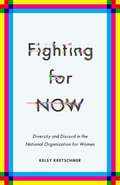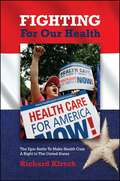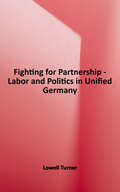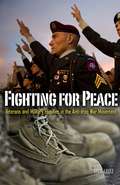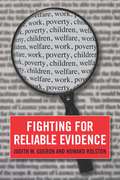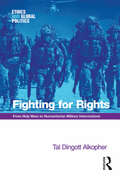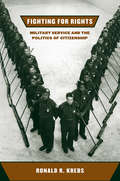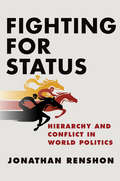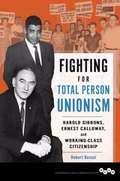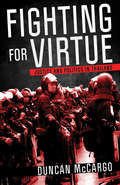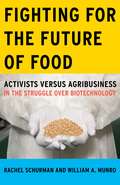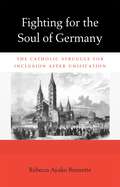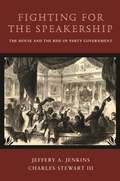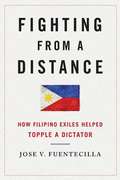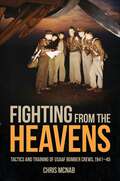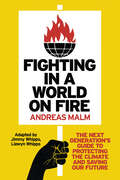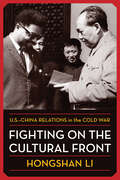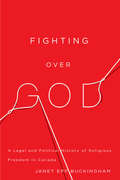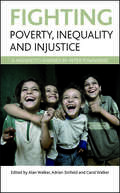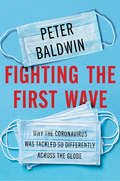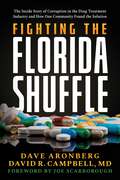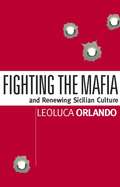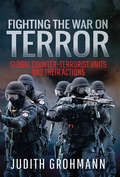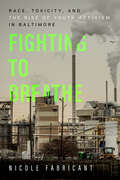- Table View
- List View
Fighting for NOW: Diversity and Discord in the National Organization for Women
by Kelsy KretschmerAn unparalleled exploration of NOW’s trajectory, from its founding to the present—and its future A new wave of feminist energy has swept the globe since 2016—from women’s marches and the #MeToo movement to transwomen’s inclusion and exclusion in feminism and participation in institutional politics. Amid all this, an organization declared dead or dying for thirty years—the National Organization for Women—has seen a membership boom. NOW presents an intriguing puzzle for scholars and activists alike. Considered one of the most stable organizations in the feminist movement, it has experienced much conflict and schism. Scholars have long argued that factionalism is the death knell of organizations, yet NOW continues to thrive despite internal conflicts. Fighting for NOW seeks to better understand how bureaucratic structures like NOW’s simultaneously provide stability and longevity, while creating space for productive and healthy conflict among members. Kelsy Kretschmer explores these ideas through an examination of conflict in NOW’s local chapters, its task forces and committees, and its satellite groups. NOW’s history provides evidence for three basic arguments: bureaucratic groups are not insulated from factionalism; they are important sites of creativity and innovation for their movements; and schisms are not inherently bad for movement organizations. Hence, Fighting for NOW is in stark contrast to conventional scholarship, which has conceptualized factionalism as organizational failure. It also provides one of the few book-length explorations of NOW’s trajectory, from its founding to the modern context. Scholars will welcome the book’s insights that draw on open systems and resource dependency theories, as well as its rethinking of how conflict shapes activist communities. Students will welcome its clear and compelling history of the feminist movement and of how feminist ideas have changed over the past five decades.
Fighting for Our Health: The Epic Battle to Make Health Care a Right in the United States
by Richard KirschThis first-person account brings readers inside the biggest and most consequential issue campaign in American history. Fighting for Our Health recounts how a reform campaign led by grassroots organizers played a crucial role in President Obama's signing historic health reform legislation in March of 2010—defeating the tea partiers, Republican Party, health insurance industry, and the US Chamber of Commerce. The action takes place inside the Beltway—the White House, Congressional anterooms, and the streets of DC—and at hundreds of town meetings, demonstrations, and confrontations in places like Danville, Virginia and Lincoln, Nebraska.The book describes the tense relationship between progressives and the Obama administration, as the President and his team both pushed for reform and made repeated concessions to the health care industry, while trying to squelch any pressure from the left.Most powerfully, it is the story of the triumph of thousands of people who had seen loved ones die, families go bankrupt, small businesses ruined, and futures destroyed by the health insurance system in the United States.The book is accessible to undergraduate and graduate students as well as the general reader. Detailed enough to interest people primarily concerned about health care policy and politics, it will also capture readers generally interested in US political dynamics and the health of American democracy.
Fighting for Partnership: Labor and Politics in Unified Germany (Cornell Studies in Political Economy Ser.)
by Lowell TurnerWest Germany from 1949 to 1990 was a story of virtually unparalleled political and economic success. This economic miracle incorporated a well-functioning political democracy, expanded to include a "social partnership" system of economic representation. Then the Wall came down. Economic crisis in the East -- industrial collapse, massive layoffs, a demoralized workforce -- triggered gloomy predictions. Was this the beginning of the end for the widely admired "German model?" Lowell Turner has extensively researched the German transformation in the 1990s. Indeed, in 1993 he was at the factory gates at Siemens in Rostock for the first major strike in post-Cold War eastern Germany. In that strike, and in a series of other incisively analyzed workplace and job developments in eastern Germany, he shows the remarkable resilience and flexibility of the German social partnership and the contribution of its institutions to unification. His controversial and, to some, radical findings will stimulate debate at home and abroad.
Fighting for Peace: Veterans and Military Families in the Anti–Iraq War Movement (Social Movements, Protest and Contention #40)
by Lisa LeitzFighting for Peace brings to light an important yet neglected aspect of opposition to the Iraq War—the role of veterans and their families. Drawing on extensive participant observation and interviews, Lisa Leitz demonstrates how the harrowing war experiences of veterans and their families motivated a significant number of them to engage in peace activism. Married to a Navy pilot herself, Leitz documents how military peace activists created a movement that allowed them to merge two seemingly contradictory sides of their lives: an intimate relation to the military and antiwar activism. Members of the movement strategically deployed their combined military–peace activist identities to attract media attention, assert their authority about the military and war, and challenge dominant pro-war sentiment. By emphasizing the human costs of war, activists hoped to mobilize American citizens and leaders who were detached from the wars in Iraq and Afghanistan, bring the wars to an end, and build up programs to take care of returning veterans and their families. The stories in Fighting for Peace ultimately reveal that America&’s all-volunteer force is contributing to a civilian–military divide that leaves civilians with little connection to the sacrifices of the military. Increasingly, Leitz shows, veterans and their families are being left to not only fight America&’s wars but also to fight against them.
Fighting for Reliable Evidence
by Howard Rolston Judith M. GueronOnce primarily used in medical clinical trials, random assignment experimentation is now accepted among social scientists across a broad range of disciplines. The technique has been used in social experiments to evaluate a variety of programs, from microfinance and welfare reform to housing vouchers and teaching methods. How did randomized experiments move beyond medicine and into the social sciences, and can they be used effectively to evaluate complex social problems? Fighting for Reliable Evidence provides an absorbing historical account of the characters and controversies that have propelled the wider use of random assignment in social policy research over the past forty years. Drawing from their extensive experience evaluating welfare reform programs, noted scholar practitioners Judith M. Gueron and Howard Rolston portray randomized experiments as a vital research tool to assess the impact of social policy. In a random assignment experiment, participants are sorted into either a treatment group that participates in a particular program, or a control group that does not. Because the groups are randomly selected, they do not differ from one another systematically. Therefore any subsequent differences between the groups can be attributed to the influence of the program or policy. The theory is elegant and persuasive, but many scholars worry that such an experiment is too difficult or expensive to implement in the real world. Can a control group be truly insulated from the treatment policy? Would staffers comply with the random allocation of participants? Would the findings matter? Fighting for Reliable Evidence recounts the experiments that helped answer these questions, starting with the income maintenance experiments and the Supported Work project in the 1960s and 1970s. Gueron and Rolston argue that a crucial turning point came during the 1980s, when Congress allowed states to experiment with welfare programs and foundations, states, and the federal government funded larger randomized trials to assess the impact of these reforms. As they trace these historical shifts, Gueron and Rolston discuss the ways that strategies for resolving theoretical and practical problems were developed, and they highlight the strict conditions required to execute a randomized experiment successfully. What emerges is a nuanced portrait of the potential and limitations of social experiments to advance empirical knowledge. Weaving history, data analysis and personal experience, Fighting for Reliable Evidence offers valuable lessons for researchers, policymakers, funders, and informed citizens interested in isolating the effect of policy initiatives. It is an essential primer on welfare policy, causal inference, and experimental designs.
Fighting for Rights: From Holy Wars to Humanitarian Military Interventions (Ethics and Global Politics)
by Tal Dingott AlkopherIn the light of NATO's humanitarian war in Kosovo is it possible to understand or explain wars as an outcome of perceptions of rights? How did rights, be they divine rights in the Middle Ages, territorial rights in the eighteenth century, or human rights today, become something that people are willing to fight and die for? To answer these questions, this book explores the linkage between concepts of rights and the practice of war in the international arena. Alkopher describes how normative structures of rights have shaped different practices of war from medieval to modern times, through the lens of social constructivism. From the eleventh to the thirteenth century, concepts of divine rights and institutionalized practices of the Crusades to the Holy Land fostered the prevailing ideas of international rights and war. In the eighteenth century, the institutionalization of states' rights and territorial wars shaped international conflict. This view held until the late twentieth century when the institutionalization of human rights coupled with the emerging practice of humanitarian war, particularly NATO's war in Kosovo, engendered new norms of international conduct. The author concludes that rights have the power to constitute an international order that will be either cooperative or conflictual and the choice of outcome is very much in our hands. This book will be essential reading for international relations and political science scholars and students but also philosophers, legal and sociological historians and international lawyers.
Fighting for Rights: Military Service and the Politics of Citizenship (Cornell Studies in Security Affairs)
by Ronald R. KrebsLeaders around the globe have long turned to the armed forces as a "school for the nation." Debates over who serves continue to arouse passion today because the military's participation policies are seen as shaping politics beyond the military, specifically the politics of identity and citizenship. Yet how and when do these policies transform patterns of citizenship? Military service, Ronald R. Krebs argues, can play a critical role in bolstering minorities' efforts to grasp full and unfettered rights. Minority groups have at times effectively contrasted their people's battlefield sacrifices to the reality of inequity, compelling state leaders to concede to their claims. At the same time, military service can shape when, for what, and how minorities have engaged in political activism in the quest for meaningful citizenship. Employing a range of rich primary materials, Krebs shows how the military's participation policies shaped Arab citizens' struggles for first-class citizenship in Israel from independence to the mid-1980s and African Americans' quest for civil rights, from World War I to the Korean War. Fighting for Rights helps us make sense of contemporary debates over gays in the military and over the virtues and dangers of liberal and communitarian visions for society. It suggests that rhetoric is more than just a weapon of the weak, that it is essential to political exchange, and that politics rests on a dual foundation of rationality and culture.
Fighting for Status: Hierarchy and Conflict in World Politics
by Jonathan RenshonThere is widespread agreement that status or standing in the international system is a critical element in world politics. The desire for status is recognized as a key factor in nuclear proliferation, the rise of China, and other contemporary foreign policy issues, and has long been implicated in foundational theories of international relations and foreign policy. Despite the consensus that status matters, we lack a basic understanding of status dynamics in international politics. The first book to comprehensively examine this subject, Fighting for Status presents a theory of status dissatisfaction that delves into the nature of prestige in international conflicts and specifies why states want status and how they get it.What actions do status concerns trigger, and what strategies do states use to maximize or salvage their standing? When does status matter, and under what circumstances do concerns over relative position overshadow the myriad other concerns that leaders face? In examining these questions, Jonathan Renshon moves beyond a focus on major powers and shows how different states construct status communities of peer competitors that shift over time as states move up or down, or out, of various groups.Combining innovative network-based statistical analysis, historical case studies, and a lab experiment that uses a sample of real-world political and military leaders, Fighting for Status provides a compelling look at the causes and consequences of status on the global stage.
Fighting for Total Person Unionism: Harold Gibbons, Ernest Calloway, and Working-Class Citizenship
by Robert BusselDuring the 1950s and 1960s, labor leaders Harold Gibbons and Ernest Calloway championed a new kind of labor movement that regarded workers as "total persons" interested in both workplace affairs and the exercise of effective citizenship in their communities. Working through Teamsters Local 688 and viewing the city of St. Louis as their laboratory, this remarkable interracial duo forged a dynamic political alliance that placed their "citizen members" on the front lines of epic battles for urban revitalization, improved public services, and the advancement of racial and economic justice. Parallel to their political partnership, Gibbons functioned as a top Teamsters Union leader and Calloway as an influential figure in St. Louis's civil rights movement. Their pioneering efforts not only altered St. Louis's social and political landscape but also raised fundamental questions about the fate of the post-industrial city, the meaning of citizenship, and the role of unions in shaping American democracy.
Fighting for Virtue: Justice and Politics in Thailand (Studies of the Weatherhead East Asian Institute, Columbia University)
by Duncan McCargoFighting for Virtue investigates how Thailand's judges were tasked by the late King Bhumibol Adulyadej (Rama IX) in 2006 with helping to solve the country's intractable political problems—and what happened next. Across the last decade of Rama IX's rule, Duncan McCargo examines the world of Thai judges: how they were recruited, trained, and promoted, and how they were socialized into a conservative world view that emphasized the proximity between the judiciary and the monarchy.McCargo delves into three pivotal freedom of expression cases that illuminate Thai legal and cultural understandings of sedition and treason, before examining the ways in which accusations of disloyalty made against controversial former prime minister Thaksin Shinawatra came to occupy a central place in the political life of a deeply polarized nation. The author navigates the highly contentious role of the Constitutional Court as a key player in overseeing and regulating Thailand's political order before concluding with reflections on the significance of the Bhumibol era of "judicialization" in Thailand. In the end, posits McCargo, under a new king, who appears far less reluctant to assert his own power and authority, the Thai courts may now assume somewhat less significance as a tool of the monarchical network.
Fighting for the Future of Food: Activists versus Agribusiness in the Struggle over Biotechnology (Social Movements, Protest and Contention #35)
by William A. Munro Rachel SchurmanWhen scientists working in the agricultural biotechnology industry first altered the genetic material of one organism by introducing genes from an entirely different organism, the reaction was generally enthusiastic. To many, these genetically modified organisms (GMOs) promised to solve the challenges faced by farmers and to relieve world hunger. Yet within a decade, this &“gene revolution&” had abruptly stalled. Widespread protests against the potential dangers of &“Frankenfoods&” and the patenting of seed supplies in the developing world forced the industry to change course. As a result, in the late 1990s, some of the world&’s largest firms reduced their investment in the agricultural sector, narrowed their focus to a few select crops, or sold off their agricultural divisions altogether.Fighting for the Future of Food tells the story of how a small group of social activists, working together across tables, continents, and the Internet, took on the biotech industry and achieved stunning success. Rachel Schurman and William A. Munro detail how the anti-biotech movement managed to alter public perceptions about GMOs and close markets to such products. Drawing strength from an alternative worldview that sustained its members&’ sense of urgency and commitment, the anti-GMO movement exploited political opportunities created by the organization and culture of the biotechnology industry itself. Fighting for the Future of Food ultimately addresses society&’s understanding and trust (or mistrust) of technological innovation and the complexities of the global agricultural system that provides our food.
Fighting for the Soul of Germany: The Catholic Struggle for Inclusion after Unification
by Rebecca Ayako BennetteHistorians have long believed that Catholics were late and ambivalent supporters of the German nation. Rebecca Ayako Bennette’s bold new interpretation demonstrates definitively that from the beginning in 1871, when Wilhelm I was proclaimed Kaiser of a unified Germany, Catholics were actively promoting a German national identity for the new Reich. In the years following unification, Germany was embroiled in a struggle to define the new nation. Otto von Bismarck and his allies looked to establish Germany as a modern nation through emphasis on Protestantism and military prowess. Many Catholics feared for their future when he launched the Kulturkampf, a program to break the political and social power of German Catholicism. But these anti-Catholic policies did not destroy Catholic hopes for the new Germany. Rather, they encouraged Catholics to develop an alternative to the Protestant and liberal visions that dominated the political culture. Bennette’s reconstruction of Catholic thought and politics sheds light on several aspects of German life. From her discovery of Catholics who favored a more “feminine” alternative to Bismarckian militarism to her claim that anti-socialism, not anti-Semitism, energized Catholic politics, Bennette’s work forces us to rethink much of what we know about religion and national identity in late nineteenth-century Germany.
Fighting for the Speakership: The House and the Rise of Party Government (Princeton Studies in American Politics: Historical, International, and Comparative Perspectives #131)
by Jeffery A. Jenkins Charles StewartThe Speaker of the House of Representatives is the most powerful partisan figure in the contemporary U.S. Congress. How this came to be, and how the majority party in the House has made control of the speakership a routine matter, is far from straightforward. Fighting for the Speakership provides a comprehensive history of how Speakers have been elected in the U.S. House since 1789, arguing that the organizational politics of these elections were critical to the construction of mass political parties in America and laid the groundwork for the role they play in setting the agenda of Congress today. Jeffery Jenkins and Charles Stewart show how the speakership began as a relatively weak office, and how votes for Speaker prior to the Civil War often favored regional interests over party loyalty. While struggle, contention, and deadlock over House organization were common in the antebellum era, such instability vanished with the outbreak of war, as the majority party became an "organizational cartel" capable of controlling with certainty the selection of the Speaker and other key House officers. This organizational cartel has survived Gilded Age partisan strife, Progressive Era challenge, and conservative coalition politics to guide speakership elections through the present day. Fighting for the Speakership reveals how struggles over House organization prior to the Civil War were among the most consequential turning points in American political history.
Fighting from a Distance: How Filipino Exiles Helped Topple a Dictator
by Jose V. FuentecillaDuring February 1986, a grassroots revolution overthrew the fourteen-year dictatorship of former president Ferdinand Marcos in the Philippines. In this book, Jose V. Fuentecilla describes how Filipino exiles and immigrants in the United States played a crucial role in this victory, acting as the overseas arm of the opposition to help return their country to democracy. A member of one of the major U.S.-based anti-Marcos movements, Fuentecilla tells the story of how small groups of Filipino exiles--short on resources and shunned by some of their compatriots--arrived and survived in the United States during the 1970s, overcame fear, apathy, and personal differences to form opposition organizations after Marcos's imposition of martial law, and learned to lobby the U.S. government during the Cold War. In the process, he draws from multiple hours of interviews with the principal activists, personal files of resistance leaders, and U.S. government records revealing the surveillance of the resistance by pro-Marcos White House administrations. The first full-length book to detail the history of U.S.-based opposition to the Marcos regime, Fighting from a Distance provides valuable lessons on how to persevere against a well-entrenched opponent.
Fighting from the Heavens: Tactics and Training of USAAF Bomber Crews, 1941–45
by Chris McNab"...expands our knowledge of bomber operations, making it a most welcome addition to the aerial combat literature." — The Journal of America's Military Past During World War II, the US Army Air Forces (USAAF) projected American military might across distances and with destructive force unimaginable just a decade previously. The B-17s and B-24s of the US Eighth Air Force, for example, turned much of Germany’s infrastructure to twisted steel and burnt rubble between 1943 and 1945. B-29 Superfortresses unleashed conventional raids on Japan of even greater area destruction than that created by the atomic bomb attacks (also delivered by USAAF crews). Beyond heavy strategic bombing, US bombers performed a multitude of other tactical roles, including hunting Axis submarines, bombing enemy shipping, low-level runs against precision targets, and providing heavy air support to advancing infantry and armor. While the US bombers dealt out violence, however, they were also prey to a terrifying spectrum of antiaircraft threats, and by the end of the war 88,119 US airmen had died in service. Bomber crews were a world unto themselves, composed of pilots, co-pilots, engineers, navigators, wireless operators, gunners, and bombardiers. And each aircraft type had its own unique characteristics and capabilities, from twin-engine B-25 Mitchells designed for strafing and skip-bombing to the four-engine workhorses of the strategic bombing campaign: the B-17 Flying Fortress, B-24 Liberator, and B-29 Superfortress. Fighting from the Heavens: Tactics and Training of USAAF Bomber Crews, 1941–45 presents an invaluable collection of material from US wartime manuals, including doctrinal, training, technical, aircraft-specific, and position-specific publications. Through these manuals, the reader gains an insider’s insight into the demands of US bomber warfare, including long-distance navigation, gun-turret operation, formation flying, bomber start-up procedures, and bomb aiming.
Fighting in a World on Fire: The Next Generation's Guide to Protecting the Climate and Saving Our Future
by Andreas MalmAn argument for bold action to halt climate destruction, adapted for young people from Andreas Malm&’s best-selling bookYoung people are inheriting a world of climate catastrophe. Young people are also one of the strongest forces leading movements for climate justice, and to halt the fossil fuel emissions that are making our Earth unlivable. As Greta Thunberg and the Fridays for the Future movement have made clear, solutions offered by adults are far too little, far too late: the measures in unenforceable international agreements won&’t halt our reliance on fossil fuels, or take the drastic steps humans need to take in order to keep our planet livable.What kinds of drastic steps are needed? What kind of bold actions can the climate justice movement begin using to bring a stop to climate destruction, and that can be employed alongside existing strategies of mass protest, awareness, and legal appeals? Why does our society consider profit for oil companies more important than the future of young people and the health of our shared environment?In this adaptation of Andreas Malm&’s best-selling book on the need for a bolder, more confrontational climate justice movement, these urgent questions are brought to the most important audience of all: those who are growing up in a world on fire.
Fighting on the Cultural Front: U.S.-China Relations in the Cold War (A Nancy Bernkopf Tucker and Warren I. Cohen Book on American–East Asian Relations)
by Hongshan LiThe Cold War conflict between the United States and the People’s Republic of China did not only encompass political, military, diplomatic, and economic clashes. The two powers also confronted each other on the cultural front. Despite a long history of extensive and mostly constructive cultural interactions, the two nations cut off existing ties in the late 1940s and early 1950s, and established new relationships aimed at attacking and isolating each other. Even after Beijing and Washington permitted cultural exchange as part of their effort to normalize diplomatic relations in the 1970s, the weaponization of cultural interactions continued.Hongshan Li provides a groundbreaking account of the confrontation between the United States and the People’s Republic of China on the Cold War’s cultural front. He investigates the origins, evolution, and significance of the role of cultural interactions in the shifting relations between the United States and the PRC from the late 1940s through the late 1970s. Li demonstrates that the drastic transformation of U.S.-China cultural interactions not only altered the course of Sino-American cultural relations but also shaped the Cold War experience of the two peoples. Fighting on the Cultural Front examines topics such as competition and conflicts over Chinese students and scholars stranded in the United States, maneuvers on the authorization of journalistic exchanges, the establishment of Taiwan as a cultural bastion, and Beijing’s promotion of its revolutionary ideology through individual U.S. citizens, particularly African Americans. This important book offers a new lens on the history of U.S.-China relations and the cultural side of the global Cold War.
Fighting over God
by Janet Epp BuckinghamFrom before Confederation to the present day, religion has been one of the most contentious issues in Canadian public life. In Fighting over God, Janet Buckingham surveys a vast array of religious conflicts, exploring both their political aspects and the court cases that were part of their resolution. While topics such as the Manitoba Schools Crisis and debates about Sunday shopping are familiar territory, Buckingham focuses on lesser-known conflicts such as those over the education of Doukhobor and Mennonite children and the banning of the Jehovah's Witness religion under the Defence of Canada Regulations during the Second World War. Subjects are explored thematically with chapters on the history of religious broadcasting, education, freedom of expression, religious practices, marriage and family, and religious institutions. Contentious issues about religious accommodation are not going away. Fighting over God cites over six hundred legal cases, across nearly four centuries, to provide a rich context for the ongoing social debate about the place of religion in our increasingly secular society.
Fighting over God: A Legal and Political (McGill-Queen's Studies in the History of Religion #2)
by Janet Epp BuckinghamFrom before Confederation to the present day, religion has been one of the most contentious issues in Canadian public life. In Fighting over God, Janet Buckingham surveys a vast array of religious conflicts, exploring both their political aspects and the court cases that were part of their resolution. While topics such as the Manitoba Schools Crisis and debates about Sunday shopping are familiar territory, Buckingham focuses on lesser-known conflicts such as those over the education of Doukhobor and Mennonite children and the banning of the Jehovah's Witness religion under the Defence of Canada Regulations during the Second World War. Subjects are explored thematically with chapters on the history of religious broadcasting, education, freedom of expression, religious practices, marriage and family, and religious institutions. Contentious issues about religious accommodation are not going away. Fighting over God cites over six hundred legal cases, across nearly four centuries, to provide a rich context for the ongoing social debate about the place of religion in our increasingly secular society.
Fighting poverty, inequality and injustice: A manifesto inspired by Peter Townsend
by Alan Walker, Adrian Sinfield and Carol WalkerThis important book makes a vital academic and political statement in the cause of social justice. It begins with an appreciation of the seminal contributions of Peter Townsend (1928-2009), and applies them to contemporary policy debates. It brings together many of the leading contributors to current debates in this field and provides a compelling manifesto for change for students and researchers in the social sciences, policy makers and practitioners, and everybody with an interest in creating a more equal and socially just society.
Fighting the First Wave: Why the Coronavirus Was Tackled So Differently Across the Globe
by Peter BaldwinCOVID-19 is the biggest public health and economic disaster of our time. It has posed the same threat across the globe, yet countries have responded very differently and some have clearly fared much better than others. Peter Baldwin uncovers the reasons why in this definitive account of the global politics of pandemic. He shows that how nations responded depended above all on the political tools available - how firmly could the authorities order citizens' lives and how willingly would they be obeyed? In Asia, nations quarantined the infected and their contacts. In the Americas and Europe they shut down their economies, hoping to squelch the virus's spread. Others, above all Sweden, responded with a light touch, putting their faith in social consensus over coercion. Whether citizens would follow their leaders' requests and how soon they would tire of their demands were crucial to hopes of taming the pandemic.
Fighting the Florida Shuffle: The Inside Story of Corruption in the Drug Treatment Industry and How One Community Found the Solution
by Dave Aronberg M.D. David R. Campbell"An unflinching view into the dark side of an industry meant to be the hope of those caught in the grip of addiction..." - Dr. Jay Kuchera, MD, FASAMMotivated by greed, Purdue Pharma's explosive marketing of its powerful painkiller, OxyContin, helped create the opioid epidemic that kills over 200 people every day in the United States. Many more battle substance use disorders that impact health, happiness, family relations, and jobs. Federal policymakers have responded with laws that require insurance policies to cover drug treatment and classify addiction as a preexisting condition. But what happens when the rehab industry itself is corrupted, leading to the untimely death of individuals in their care? Fighting the Florida Shuffle is a gripping account of how unscrupulous players have infiltrated the drug treatment industry, and how well-intended, yet naïve policymakers continue to incentivize relapse over recovery. Former State Attorney Dave Aronberg and MSNBC Chief Medical Correspondent Dr. Dave Campbell tell the stories of victims enticed with free plane tickets and other illicit benefits to enter substandard outpatient rehab and live in flophouses masquerading as "sober homes," leaving too often in ambulances and body bags. The authors offer an insiders' perspective from the world of law enforcement and medicine on how corporate malfeasance fueled the rise in opioid overdoses, how families can identify and avoid rehab scams, and how one community fought back to clean up the industry and put the worst offenders behind bars. Drug treatment has become a thriving enterprise, but the profit motive has lured predators to exploit the vulnerable who seek help. As rogue rehab owners line their pockets through insurance fraud, patient brokering and illegal kickbacks, their victims leave behind grieving families and loved ones, who wonder how the insurance coverage thought to be a lifeline led to increased overdose and premature death.
Fighting the Mafia & Renewing Sicilian Culture
by Leoluca OrlandoGrowing up in an aristocratic family that seems almost to have stepped out of the pages of The Leopard, Leoluca Orlando entered law and politics in the late 1970s as one of the young idealists identified with the Catholic Church who were challenging the Mafia's control of Sicilian life. At about the same moment, life in Sicily was becoming more perilous. As if the "old" Mafia had not been bad enough, a new and particularly vicious Mafia sect based in the town of Corleone was murdering its way to power. Fueled by profits from the international heroin trade, this mafia gansteristica made Sicily into an Italian Lebanon and filled the international press with pictures of bloody bodies-those of Mafia rivals as well as police and government law enforcement officials.One of the figures most prominently identified with Italy's offensive against the Mafia, Orlando has endured repeated assassination attempts and even today travels with a bodyguard. Fighting the Mafia is his dramatic tale of witness and survival, of his effort to expose Mafia infiltration into the highest levels of Italian life and politics, and of the movements he helped to build-in schools and churches and at the ballot box-to recapture Sicilian culture and inspire a renaissance of democracy.
Fighting the War on Terror: Global Counter-Terrorist Units and their Actions
by Judith GrohmannSWAT teams, GSG9, EKO Cobra, SCO 19 these elite police units are used to dealing with dangerous situations, particularly in the fight against global terrorism. European political-economic journalist and author, Judith Grohmann, is the first outsider to be given access into the world of specialist counter-terrorism units in 16 countries around the globe, including the USA, Russia, Israel, the UK, and many more. Whether performing hostage rescues, subduing barricaded suspects, engaging with heavily-armed criminals or taking part in counter-terrorism operations, her interviews with the men and women concerned explain what their work really involves, their most dangerous missions, and the physical and mental training required for them to perform these high-risk operations, which fall outside the abilities of regular police officers.A truly intimate insight into a closed world.
Fighting to Breathe: Race, Toxicity, and the Rise of Youth Activism in Baltimore (California Series in Public Anthropology #54)
by Nicole FabricantIndustrial toxic emissions on the South Baltimore Peninsula are among the highest in the nation. Because of the concentration of factories and other chemical industries in their neighborhoods, residents face elevated rates of lung cancer and other respiratory illnesses in addition to heart attacks, strokes, and cardiovascular disease, all of which can lead to premature death. Fighting to Breathe follows a dynamic and creative group of high school students who decided to fight back against the race- and class-based health disparities and inequality in their city. For more than a decade, student organizers stood up to unequal land use practices and the proposed construction of an incinerator and instead initiated new waste management strategies. As a Baltimore resident and activist-scholar, Nicole Fabricant documents how these young organizers came to envision, design, and create a more just and sustainable Baltimore.
